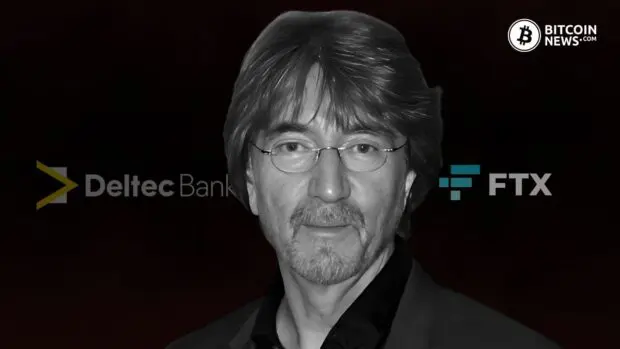Deltec Bank and Trust Ltd, a Bahamas-based financial institution, has found itself embroiled in controversy amidst accusations of aiding the now defunct FTX exchange’s fraudulent activities involving digital asset transactions. Allegations suggest that the bank extended substantial lines of credit and facilitated questionable transfers, raising concerns about its involvement in potential financial misconduct.
Accusations of Secret Credit Lines and Misuse of Funds
According to court documents and testimonies, Deltec is accused of secretly extending a $2 billion line of credit to Alameda Research, a trading firm associated with Sam Bankman-Fried (SBF). This credit line allegedly enabled Alameda Research to engage in the creation and trading of Tether stablecoins, a popular digital asset, without immediate financial backing.
The lawsuit states that Caroline Ellison, CEO of Alameda Research, claimed that Deltec’s “unofficial” or “secret” line of credit to Alameda allowed them to generate around $40 billion in Tether stablecoins. This amount constituted nearly half of the total Tether circulation at that particular time.
Furthermore, the lawsuit claims that Deltec assisted SBF in misappropriating customer funds, transferring them between accounts and prioritizing withdrawals for certain entities.
Involvement in Digital Assets Transactions
The accusations against Deltec shed light on its significant role in facilitating digital asset transactions, particularly within the Tether ecosystem. Documents suggest that the bank played a central role in the issuance and redemption of Tether stablecoins, contributing to the expansion of this digital asset market.
Ellison highlighted in her court statements:
“I do not recall specifically when Deltec began to offer Alameda the unofficial Deltec line of credit, but my best recollection is that Deltec allowed Alameda to access the unofficial Deltec line of Credit in 2020 and 2021. I do not know if any similar service was offered to Deltec’s other clients. I recall that Mr Pepin (the deputy chief executive at Deltec) repeatedly asked that Alameda keep the arrangement secret. I am not aware of any documentation or terms under which the unofficial Deltec line of credit was offered. I suspected from Mr Pepin’s statements and conduct that the unofficial Deltec line of credit may not have been accurately reflected on Deltec’s books.”
Deltec Bank’s Questionable Banking Practices
The lawsuit further alleges that Deltec Bank failed to adhere to regulatory compliance standards, including Know Your Customer (KYC) and anti-money laundering (AML) regulations. Deltec is accused of sharing sensitive compliance information with digital asset exchanges, potentially aiding them in evading regulatory scrutiny. Additionally, the bank is accused of fabricating documents to circumvent regulatory requirements, raising concerns about its commitment to ethical banking practices.
Deltec allegedly provided 17 accounts for the FTX exchange, including one for Alameda. During the exchange’s collapse, the main contact at Deltec was Gregory Pepin, the deputy chief executive, assisted by Michel Giacomotti, a business development manager.
The class action lawsuit alleges:
“Mr Pepin and Mr Giacomotti frequently communicated with Alameda, FTX Trading and FTX Group on various chat groups through the messaging platform Telegram. The group was close-knit, as the Telegram messages show. The Alameda team, Mr Pepin and Mr Giacomotti would joke about buying private islands together.”
Financial Relationships and Investments
Deltec’s financial relationships with entities like FTX and Alameda Research have come under scrutiny, with allegations of preferential treatment and undisclosed investments. The lawsuit highlights Deltec’s receipt of a $50 million loan from an entity associated with FTX, raising questions about the nature of their financial dealings. Furthermore, text messages suggest close ties between Deltec executives and individuals involved in digital asset trading, indicating potential conflicts of interest.
The lawsuit states:
“In October 2021, Deltec’s parent company, Deltec International Group, received a $50m loan from Norton Hall Ltd, an entity controlled by Ryan Salame, chief executive of FTX’s Bahamian outfit. This is reportedly the same entity through which Alameda ‘loaned’ $55m to Mr Salame, paid for with class member funds.”
Impact on Customers and Investors
The allegations against Deltec Bank have significant implications for customers and investors in the digital asset market. Concerns about the integrity of banking institutions involved in digital asset transactions could erode trust and confidence in the broader financial ecosystem. Moreover, the potential misuse of customer funds raises serious ethical and legal concerns, necessitating a thorough investigation into Deltec’s practices.
Response from Deltec and Legal Representatives
In response to the allegations, Deltec has vehemently denied any wrongdoing, emphasizing its commitment to defending against what it describes as “meritless claims.” Legal representatives for Deltec have highlighted the lack of concrete evidence supporting the accusations, suggesting that they are based on unsubstantiated statements from individuals with vested interests. However, the seriousness of the allegations warrants careful scrutiny and impartial investigation.
Deltec Bank & Trust said in a written response to The Tribune:
“We are aware of the amended complaint filed by plaintiffs’ lawyers in the FTX matter. The new complaint does not cure the defects of the prior complaints and Deltec will continue to vigorously defend against these meritless claims, which do not belong in a US court. The new allegations rely heavily on unsubstantiated statements by individuals who we understand are settling their lawsuits with plaintiffs in exchange for providing the information. Like the rest of the world, Deltec Bank and Jean Chalopin had no knowledge of FTX’s misconduct until it was made public.”
Conclusion
The allegations against Deltec Bank underscore the complex and evolving landscape of digital asset transactions and the role of financial institutions in facilitating these activities. As regulatory scrutiny intensifies and investor awareness grows, the need for transparency and accountability in banking practices becomes increasingly paramount. The outcome of the legal proceedings and investigations surrounding Deltec will likely have far-reaching implications for the entire digital asset industry and the broader financial sector as a whole.










